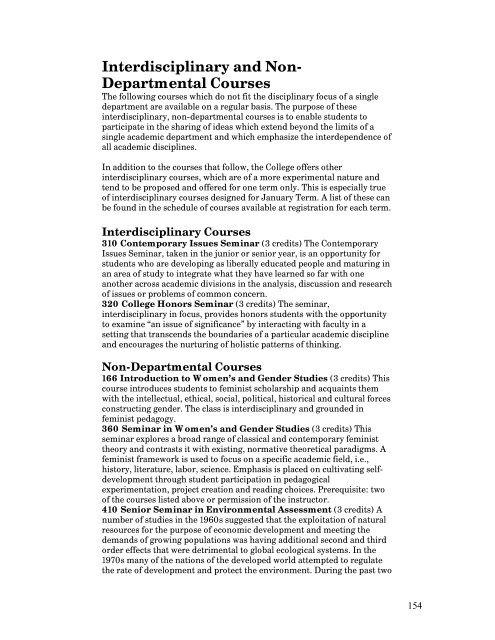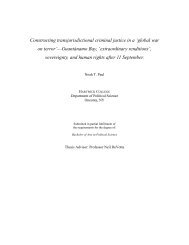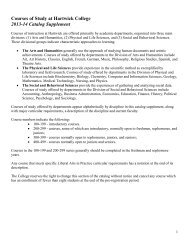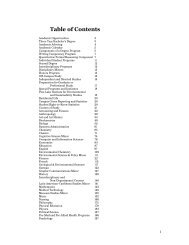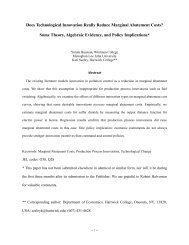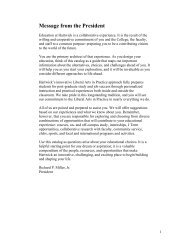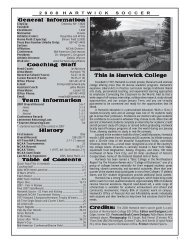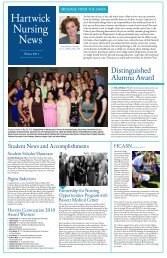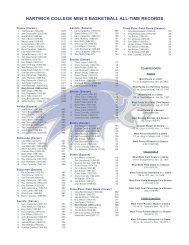Table of Contents - Hartwick College
Table of Contents - Hartwick College
Table of Contents - Hartwick College
You also want an ePaper? Increase the reach of your titles
YUMPU automatically turns print PDFs into web optimized ePapers that Google loves.
Interdisciplinary and Non-<br />
Departmental Courses<br />
The following courses which do not fit the disciplinary focus <strong>of</strong> a single<br />
department are available on a regular basis. The purpose <strong>of</strong> these<br />
interdisciplinary, non-departmental courses is to enable students to<br />
participate in the sharing <strong>of</strong> ideas which extend beyond the limits <strong>of</strong> a<br />
single academic department and which emphasize the interdependence <strong>of</strong><br />
all academic disciplines.<br />
In addition to the courses that follow, the <strong>College</strong> <strong>of</strong>fers other<br />
interdisciplinary courses, which are <strong>of</strong> a more experimental nature and<br />
tend to be proposed and <strong>of</strong>fered for one term only. This is especially true<br />
<strong>of</strong> interdisciplinary courses designed for January Term. A list <strong>of</strong> these can<br />
be found in the schedule <strong>of</strong> courses available at registration for each term.<br />
Interdisciplinary Courses<br />
310 Contemporary Issues Seminar (3 credits) The Contemporary<br />
Issues Seminar, taken in the junior or senior year, is an opportunity for<br />
students who are developing as liberally educated people and maturing in<br />
an area <strong>of</strong> study to integrate what they have learned so far with one<br />
another across academic divisions in the analysis, discussion and research<br />
<strong>of</strong> issues or problems <strong>of</strong> common concern.<br />
320 <strong>College</strong> Honors Seminar (3 credits) The seminar,<br />
interdisciplinary in focus, provides honors students with the opportunity<br />
to examine “an issue <strong>of</strong> significance” by interacting with faculty in a<br />
setting that transcends the boundaries <strong>of</strong> a particular academic discipline<br />
and encourages the nurturing <strong>of</strong> holistic patterns <strong>of</strong> thinking.<br />
Non-Departmental Courses<br />
166 Introduction to Women’s and Gender Studies (3 credits) This<br />
course introduces students to feminist scholarship and acquaints them<br />
with the intellectual, ethical, social, political, historical and cultural forces<br />
constructing gender. The class is interdisciplinary and grounded in<br />
feminist pedagogy.<br />
360 Seminar in Women’s and Gender Studies (3 credits) This<br />
seminar explores a broad range <strong>of</strong> classical and contemporary feminist<br />
theory and contrasts it with existing, normative theoretical paradigms. A<br />
feminist framework is used to focus on a specific academic field, i.e.,<br />
history, literature, labor, science. Emphasis is placed on cultivating selfdevelopment<br />
through student participation in pedagogical<br />
experimentation, project creation and reading choices. Prerequisite: two<br />
<strong>of</strong> the courses listed above or permission <strong>of</strong> the instructor.<br />
410 Senior Seminar in Environmental Assessment (3 credits) A<br />
number <strong>of</strong> studies in the 1960s suggested that the exploitation <strong>of</strong> natural<br />
resources for the purpose <strong>of</strong> economic development and meeting the<br />
demands <strong>of</strong> growing populations was having additional second and third<br />
order effects that were detrimental to global ecological systems. In the<br />
1970s many <strong>of</strong> the nations <strong>of</strong> the developed world attempted to regulate<br />
the rate <strong>of</strong> development and protect the environment. During the past two<br />
154


